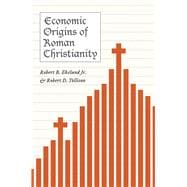
Note: Supplemental materials are not guaranteed with Rental or Used book purchases.
Purchase Benefits
What is included with this book?
| Preface | p. xi |
| Roman Christianity: An Evolving Monopoly | p. 1 |
| Introduction | p. 1 |
| Aspiring to Monopoly | p. 5 |
| A Word on Method | p. 8 |
| The Roman Church as a High Medieval Monopoly | p. 9 |
| Plan of the Book | p. 13 |
| Religion, History, and Social Science | p. 19 |
| Introduction | p. 19 |
| Adam Smith and Max Weber | p. 21 |
| Contemporary Theoretical Approaches to the Demand for Religion | p. 23 |
| Monopoly, Rationality, History, and Religion | p. 29 |
| Conclusion: Economics and Religious Behavior | p. 31 |
| Economics of Religious Belief | p. 32 |
| Introduction | p. 32 |
| Nature of the Religious Good | p. 33 |
| Demands and Contracts for the Religious Good | p. 39 |
| Conclusion: Focus on First-Millennium Christianity | p. 50 |
| Entrepreneurship, Networking, and the Success of Early Christianity | p. 51 |
| Introduction | p. 51 |
| Economic Analysis and Early Christianity | p. 52 |
| Entrepreneurship: Proselytizing the New Religion | p. 60 |
| Network-Consumption Externalities and Credence Issues | p. 65 |
| The Adoption of Christianity: The Role of Saint Paul | p. 70 |
| Conclusion | p. 75 |
| Constantine and Rome's Acceptance of Christianity | p. 78 |
| Introduction | p. 78 |
| A Theory of the Adoption and Cartelization of Christianity by Rome | p. 80 |
| Roman Acceptance of Christianity: Economic Factors | p. 86 |
| The Critical Role of Constantine and the March to Cartelization | p. 90 |
| Conclusion | p. 103 |
| The Drive to Church Monopoly: Constantine to Charlemagne | p. 106 |
| Introduction | p. 106 |
| Economic Theory and Christianity in the Fourth-Twelfth Centuries | p. 108 |
| Constantine through Justinian and Gregory I: Centuries of Competition and Consolidation | p. 116 |
| The Frankish Kingdoms, Charlemagne, and the Rescue of the Roman Papacy | p. 131 |
| Conclusion: The Roman Church circa the Early Ninth Century | p. 138 |
| Roman Christian Monopoly in the Early Medieval Period | p. 142 |
| Introduction: The Bumpy Road to Monopoly | p. 142 |
| After Charlemagne: Breakdowns, Conflict, and Invasions | p. 145 |
| Competition with Byzantium and the "Great Schism" | p. 155 |
| Roman Church Monopoly Solidifies | p. 162 |
| Conclusion | p. 167 |
| Conclusion: The Roman Church Monopoly Triumphant | p. 171 |
| Introduction | p. 171 |
| How the Church Reached Monopoly Status | p. 172 |
| Roman Monopoly Processes and Market Entry | p. 178 |
| Does the Economics of Early Christianity Relate to Contemporary Religion? | p. 183 |
| Appendix: The Impact of Saint Paul | p. 197 |
| Notes | p. 205 |
| References | p. 243 |
| Index | p. 257 |
| Table of Contents provided by Ingram. All Rights Reserved. |
The New copy of this book will include any supplemental materials advertised. Please check the title of the book to determine if it should include any access cards, study guides, lab manuals, CDs, etc.
The Used, Rental and eBook copies of this book are not guaranteed to include any supplemental materials. Typically, only the book itself is included. This is true even if the title states it includes any access cards, study guides, lab manuals, CDs, etc.